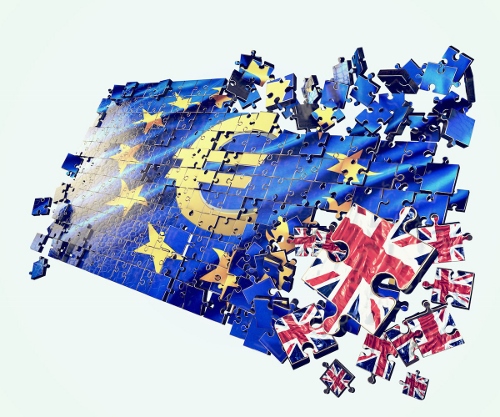Tories Out! General election now! Fight for a 24 hour general strike
Hannah Sell, Socialist Party deputy general secretary
“The referendum result may well go down in history as the pitchfork moment”, declared the Financial Times (FT), wailing the anger and despair of Britain’s elite at the decision by the majority of voters in Britain to leave the European Union.
For the capitalist class in Britain and across the EU as a whole, this is a major blow described by the FT as “the biggest setback in the EU’s history”.
For British capitalism in particular it is a terrible defeat. It could lead to the break-up of the United Kingdom if there is another vote for independence in Scotland, and also lead to the collapse of the Tory Party, once among the most successful capitalist parties on the planet.
It is also possible that the Labour Party could split in the aftermath of 23 June as the pro-business right plot to remove Jeremy Corbyn. Politics has been thrown into turmoil.
Many of the seventeen million people who voted for exit, however, will have woken up with a sense of elation that they had been able to express their rage at everything they have suffered as a result of big business making the working class pay for the economic crisis in recent years: low pay, zero hour contracts, benefit cuts, the lack of affordable housing, and public services cut to the bone.
What is more, by doing so they have forced Cameron – the hated prime minister – to announce his resignation.
Not only in Britain but across Europe many workers have been inspired by this vote against the bosses’ EU. There is no doubt that many workers in Greece, whose living standards have been devastated at the hands of the institutions of the EU, will have been cheering at the result of the referendum.
In response to the referendum result, the financial markets are in upheaval, with sterling plunging to its lowest levels for thirty years. In part this is because the financiers, the ’masters of the universe’, had arrogantly calculated that their choice would win the day, and so were not prepared for the Brexit victory.
The gyrations of the financial markets will not necessarily be immediately reflected in a new crisis in the ’real’ economy, either in Britain or worldwide. However, the referendum debate has been used by Chancellor Osborne to distract from the signs of a new stage of economic crisis for both UK and world capitalism, which is developing regardless of Brexit, and can be added to by the shockwaves caused by the referendum result.
Project fear
During the referendum ’project fear’ reached gigantic proportions. Economic catastrophe, third world war and the fear of an increase in racism and intolerance were all used to try and browbeat voters into supporting ’Remain’. Legitimate fears around these issues were major factors in why 48% of people did decide to vote for Remain. In particular it appears that a majority of young people voted Remain partly because of fears that racism would grow if there was a vote for exit.
Nonetheless, it is incredible the number of people who voted for ’Leave’ and used the referendum as an opportunity to oppose the undemocratic, remote EU and to protest; ignoring threats from the leaders of all of Britain’s establishment parties, plus every world leader from Obama to Merkel.
Incredibly cynically, even the terrible murder of Labour MP and Remain campaigner Jo Cox was used to try and increase the vote for Remain.
Without doubt the dangerous atmosphere whipped up by right-wing politicians during the referendum debate has increased the danger of racist and far-right attacks. But it was not only the racism of the official Leave side, but also the constant attacks on migrants by Cameron, with the Labour right wing even demanding that he went further in the final days of the campaign! Regardless of the outcome of the referendum, it would have been equally necessary for the workers’ movement to stand clearly for unity, against racism and in defence of the rights of migrant workers in Britain.
At the same time, it is completely false to suggest that the exit vote had – in the main – a right wing or racist character. Of course, some of those who voted for exit will have done so for racist or nationalist reasons, but the fundamental character of the exit vote was it was a working class revolt.
Particularly with a referendum, where voters are given a binary ’yes or no’ choice – there are bound to be different motivations among people who voted on both sides. But in fact no working class movement is 100% pure, completely without reactionary elements or sub-currents. It is the job of socialists to see what is primary – in this case a largely working class electoral uprising against the establishment.
In general, there was a correlation between the amounts of poverty in an area and there being a majority for exit. Scotland and Northern Ireland, where the referendum was seen differently, were exceptions. However, in England and Wales it was not only white working class areas, but also more ethnically diverse working class areas that voted to leave.
A majority in Bradford, with a high Asian population, for example voted for leave. Although in London – with a younger and relatively wealthier population – a majority voted for Remain, the number of ’Leavers’ was much higher in poorer boroughs.
In Barking and Dagenham, where less than half of the population now identify as white British, 62% of people voted to leave. In neighbouring Newham, one of the poorest and also the most ethnically diverse area of the country, 47% voted to leave.
While the scale of immigration became a central issue in the referendum campaign for the majority this was in the main not about opposing people who have come to Britain from other countries. Instead it was based on experience of employers using any means they can – including workers from other countries – to drive down wages, plus anger at the huge cuts that have taken place to public services and fear that they could not cope with a further increase in the population.
The fact that even Farage had to make clear that he did not favour any existing EU migrants losing their right to stay in the country is a reflection of that mood, although of course the workers’ movement must fight to make sure that is the case.
This has to be linked to a struggle for a £10 an hour minimum wage, the rate for the job for all workers and opposition to cuts in public services as the only way to defend the rights of all workers, regardless of their country of origin.

Expressing anger
The electoral uprising that has taken place was predicted by the Socialist Party. As we explained in the document agreed at our national conference in March: “Like the 2014 Scottish independence vote, it is possible that the EU referendum could become a means by which many workers express their rage at continued austerity. We have to pose the referendum in those terms, explaining that voting ’Leave’ could lead to the possibility of getting the Tories out.”
Now, once the referendum is over, this has been weakly recognised by Momentum, the organisation initially set up to organise support for Jeremy Corbyn, when it said: “Millions appear to have chosen ’Leave’ to vote against the unfettered globalisation that has seen living standards stagnate or fall, as the cost of living rises.” Unfortunately, however, they have only recognised that today, having spent the referendum campaigning for Remain!
In fact, the revolt took place despite the complete failure of the majority of leaders of the trade union movement and, unfortunately, also Jeremy Corbyn to put an independent working class position in the referendum by leading a socialist, internationalist campaign for exit completely independent from and in opposition to the ’Little Englanders’ of UKIP and Co.
This is what the Socialist Party did; explaining we are against the bosses’ EU, which acts in the interests of the 1%, but in favour of workers’ solidarity across the continent and standing for a voluntary socialist confederation of Europe.
Instead, Frances O’Grady, general secretary of the TUC, appeared alongside the leader of the Tories in Scotland, Ruth Davidson, without one word of criticism of the Tory government.
Jeremy Corbyn and John McDonnell did correctly refuse to appear alongside Tory politicians but nonetheless were ruthlessly used by David Cameron to try and win a majority for Remain and save his own skin.
In the Observer (12 June 2016) David Cameron brazenly declared that he couldn’t “be accused of an establishment stitch-up” because he was “saying listen to Jeremy Corbyn and the Green party”.
The political situation would have been transformed if Jeremy Corbyn had stuck by his own historic position of opposition to the EU because, as he said at the time of the Maastricht Treaty: “It takes away from national parliaments the power to set economic policy and hands it over to an unelected set of bankers.”
A campaign explaining how nationalisation of the railways or the steel industry are illegal under EU law, and standing in solidarity with workers in Greece, Ireland and the rest of the EU, could have increased the majority for exit and forced not just Cameron’s resignation but an immediate general election, with the coming to power of a Jeremy Corbyn-led Labour government being posed.
The complete absence of a mass working class voice in the referendum has left the ground free to the ex-Tory ex-stockbroker Nigel Farage to falsely pose as the voice of the ’little people’. In reality, of course, the divisive Little Englander ideas of UKIP offer no way forward for working class people.
However, despite the serious mistakes made by the majority of the leaders of the workers’ movement in the referendum campaign, it is not at all automatic that UKIP and their ilk will be the gainers from it.
A clear call now for an immediate general election could still lead to the coming to power of a Jeremy Corbyn-led Labour government, especially if an anti-austerity programme is put forward.
At the same time, the trade union movement needs to go on the offensive against this weak and divided Tory government, fighting for a 24-hour general strike to be called against any new threats of austerity in the wake of Brexit.
The 91% vote in favour of strike action by the teaching union, the NUT, gives an indication of the mood that was developing even before the referendum. So did the votes to demand councils implement no cuts budgets by the Unison and Unite local government executives, the GMB conference and the Wales TUC.
Those resolutions, however, now need to be turned into action. The National Shops Stewards Network conference, taking place on 2 July, will be an important opportunity for rank and file trade unionists to come together and discuss how to build such a movement.
Of course, for big business in Britain a Jeremy Corbyn-led Labour government is a nightmare they will do their utmost to avoid, fearing the huge expectations it would raise among working class people who have suffered years of austerity.
Therefore the capitalist class and their loyal representatives on the Labour benches are now, as we have warned, already attempting to lay the blame for the Brexit vote at Jeremy Corbyn’s door and use it as an excuse to move against him.
As we write, two arch right-wing Labour MPs, Margaret Hodge and Anne Coffey, have presented a motion of no confidence in Jeremy Corbyn to be debated by the Parliamentary Labour Party.
Jeremy Corbyn’s election as Labour leader was an expression of the growing anti-austerity mood in society. Although, unexpectedly, it found an expression in the Labour Party leadership contest, this was primarily a movement from outside of Labour, primarily of young people and some ’old Labour’ returners, who were looking for something different to the succession of party leaders – Tory and New Labour – that have acted in the interests of the 1%.
Unfortunately, however, from the beginning Jeremy Corbyn has been surrounded by a Blairite Labour machine determined to undermine and remove him.
The last months have shown, as we warned, that no compromise with these representatives of the capitalist establishment is possible. On the contrary, any further retreats by the Labour leadership would inevitably lead to an ebbing of support for Jeremy Corbyn among those who have been enthused by his stance.
Instead the challenge from the right should be met implacably and with determination. Jeremy Corbyn rightly said that many had voted for Brexit in protest against austerity.
Fight austerity
He should now launch a fight against austerity, with the programme which he stood for Labour leader on as its starting point. This should include making clear that he opposes austerity whoever it is implemented by: Brussels, Westminster or local councils. Such a stand – including a £10 an hour minimum wage and mass council housebuilding – would be able to enthuse not just those who elected him as leader, but growing numbers of the workers however they voted in the referendum.
The capitalist class are facing a crisis; they are fumbling around to try and find parties that can act reliably in their interests. It will not be easy for them to avoid calling a general election. It is even possible now that the divisions in both Labour and the Tories, who are in reality only held together by the electoral system, can lead to a realignment of British politics. A split in the Tories and Labour could lead to a new alignment of the pro-capitalist wing of the Labour Party and the pro-EU Tories.
It is not for nothing that Janan Ganesh comments in the Financial Times (14 June 2016): “The Tory and Labour moderates newly mingling in the Remain offices rather get on.” It is even possible that the capitalist class could shift towards supporting a change in the electoral system to proportional representation in order to try and put such a coalition into power.
But while the capitalist class are in chaos, it is urgent that the working class finds its own political voice. The referendum result shows the enormous potential for a mass fight back against austerity in Britain. The task is to create a mass political party capable of leading such a fight back, politically armed with socialist policies.






